初中英语总复习材料(仁爱版)
最新仁爱版七年级英语下册期末知识点总复习
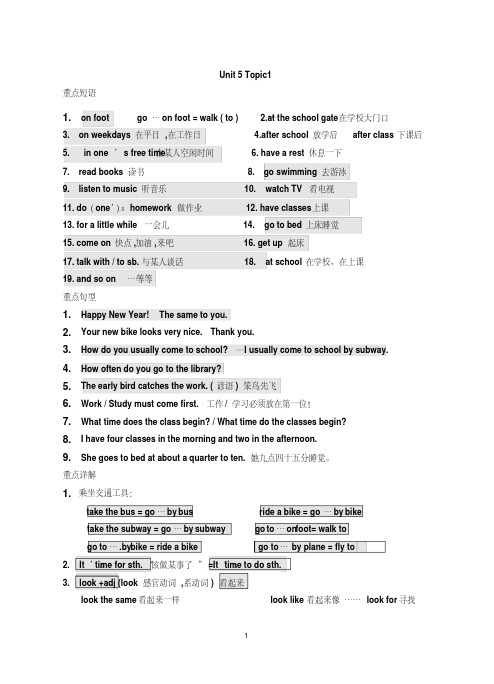
Unit 5 Topic1重点短语1.on foot go …on foot = walk ( to )… 2.at the school gate在学校大门口3. on weekdays 在平日 ,在工作日4.after school 放学后after class 下课后在某人空闲时间 6. have a rest 休息一下5. in one’s free time7. read books 读书8. go swimming 去游泳9. listen to music 听音乐10. watch TV 看电视11. do(one’s)homework 做作业12. have classes 上课13. for a little while 一会儿14. go to bed 上床睡觉15. come on 快点,加油,来吧16. get up 起床17. talk with / to sb.与某人谈话18. at school 在学校、在上课19. and so on ……等等重点句型1.Happy New Year! The same to you.2.Your new bike looks very nice. Thank you.3.How do you usually come to school? —I usually come to school by subway.4.How often do you go to the library?5.The early bird catches the work. (谚语) 笨鸟先飞6.Work / Study must come first. 工作/ 学习必须放在第一位!7.What time does the class begin? / What time do the classes begin?8.I have four classes in the morning and two in the afternoon.9.She goes to bed at about a quarter to ten. 她九点四十五分睡觉。
仁爱英语九年级第一轮总复习材料(九上unit1)
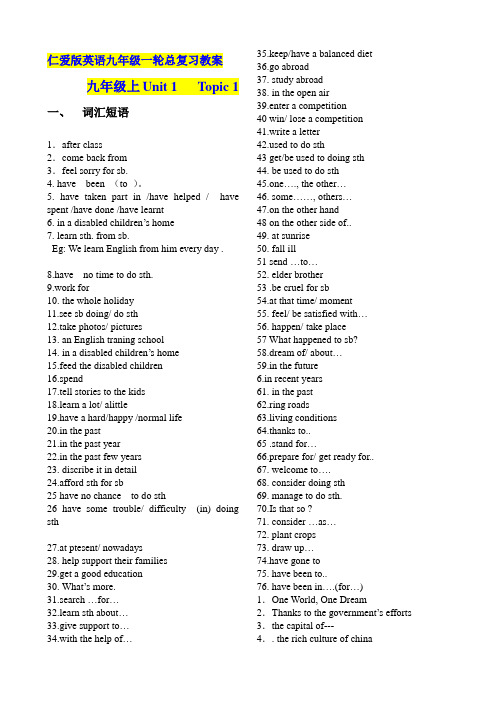
仁爱版英语九年级一轮总复习教案九年级上Unit 1 Topic 1 一、词汇短语1.after class2.come back from3.feel sorry for sb.4. have been (to )。
5. have taken part in /have helped / have spent /have done /have learnt6. in a disabled children’s home7. learn sth. from sb.Eg: We learn English from him every day .8.have no time to do sth.9.work for10. the whole holiday11.see sb doing/ do sth12.take photos/ pictures13. an English traning school14. in a disabled children’s home15.feed the disabled children16.spend17.tell stories to the kids18.learn a lot/ alittle19.have a hard/happy /normal life20.in the past21.in the past year22.in the past few years23. discribe it in detail24.afford sth for sb25 have no chance to do sth26 have some trouble/ difficulty (in) doing sth27.at ptesent/ nowadays28. help support their families29.get a good education30. What’s more.31.search …for…32.learn sth about…33.give support to…34.with the help of…35.keep/have a balanced diet36.go abroad37. study abroad38. in the open air39.enter a competition40 win/ lose a competition41.write a lettered to do sth43 get/be used to doing sth44. be used to do sth45.one…., the other…46. some……, others…47.on the other hand48 on the other side of..49. at sunrise50. fall ill51 send …to…52. elder brother53 .be cruel for sb54.at that time/ moment55. feel/ be satisfied with…56. happen/ take place57 What happened to sb?58.dream of/ about…59.in the future6.in recent years61. in the past62.ring roads63.living conditions64.thanks to..65 .stand for…66.prepare for/ get ready for..67. welcome to….68. consider doing sth69. manage to do sth.70.Is that so ?71. consider …as…72. plant crops73. draw up…74.have gone to75. have been to..76. have been in….(for…)1.One World, One Dream 2.Thanks to the government’s efforts 3.the capital of---4.. the rich culture of china5.as well6.with the help of =with one’s help.7.divide my money into two parts.8. at that time/on that day9. --enough--- to do sth.10.made such rapid progress11. write an article about12.the Chinese teenagers’ lives二、重点句子1.Did you have a good summer holiday?2.How was your trip?3.In one place I saw children working for acruel boss.4.I felt sorry for them.5.A: Where have you been, Jane?B: I have been to Mount Huang with my parents.6.A: Where has he/she / kangkang been?B: He has been to an English training school to improve his English.7.There goes the bell。
【暑假作业】仁爱版七年级英语暑假总复习及部分答案
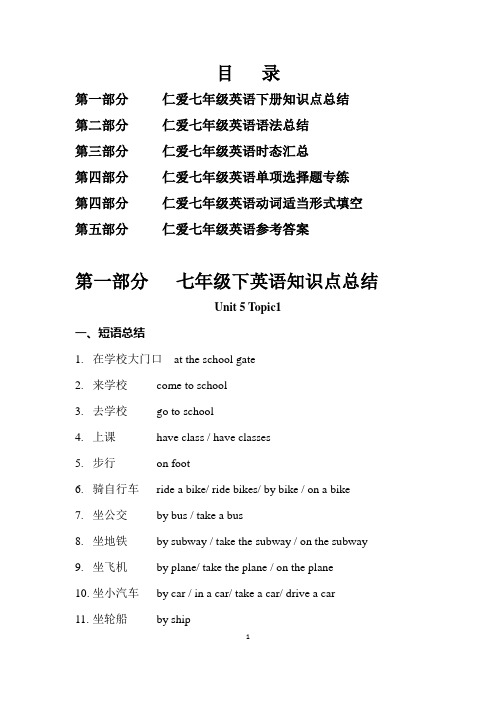
目录第一部分仁爱七年级英语下册知识点总结第二部分仁爱七年级英语语法总结第三部分仁爱七年级英语时态汇总第四部分仁爱七年级英语单项选择题专练第四部分仁爱七年级英语动词适当形式填空第五部分仁爱七年级英语参考答案第一部分七年级下英语知识点总结Unit 5 Topic1一、短语总结1. 在学校大门口at the school gate2. 来学校come to school3. 去学校go to school4. 上课have class / have classes5. 步行on foot6. 骑自行车ride a bike/ ride bikes/ by bike / on a bike7. 坐公交by bus / take a bus8. 坐地铁by subway / take the subway / on the subway9. 坐飞机by plane/ take the plane / on the plane10. 坐小汽车by car / in a car/ take a car/ drive a car11. 坐轮船by ship12. 坐小船by boat13. 坐火车by train / on the train14. 在我们组in our group15. 一群学生 a group of students16. 我们中的三个人three of us17. 在平日on weekdays18. 在周末on the weekends / at weekends19. 起床get up20. 睡觉go to bed21. 早起get up early22. 回家go home23. 到家get home24. 去动物园go to the zoo25. 去公园go to the park26. 看电影see a movie / film27. 看电视watch TV28. 在晚上in the evening / at night29. 帮助父母help parents30. 做某人的家庭作业do one’s ( my/ her/ his/ your/ their)homework31. 在学校at school32. 知道,了解know about / learn about33. 校园生活school life34. 一个美国学生an American student35. 在美国in America / in the U.S.A.36. 许多学生many students/ a lot of students/ lots of students37. 很少very few38. 吃午饭have lunch39. 出去吃饭eat out40. 在校期间on school days41. 休息一会have a short rest/ break42. 午饭后after lunch43. 在某人的业余时间in one’s ( my/ his/ her/ their…)free/ spare time44. 打篮球play basketball45. 踢足球play soccer / football46. 弹钢琴play the piano47. 弹吉他play the guitar48. 拉二胡play erhu49. 去游泳go swimming / go for a swim50. 去划船go boating51. 球赛a ball game / ball games52. 一年四次four times a year53. 听音乐listen to music54. 读书read books55. 看报read newspapers56. 看医生see a doctor57. 去图书馆go to the library58. 一周两次twice a week59. 见朋友meet friends60. 每天every day61. 在七点半at half past seven62. 一小会for a little while / for a short time63. 晚饭后after supper64. 吃饭have dinner65. 吃早饭have breakfast二、重要句型1. I usually come to school by subway.同义句: I usually take the subway to school.对划线部分提问: How do you usually come to school?类似的有:go to school by bike=go to schoolon a bike= ride a bike to school=ride to schoolgo home by bus=go home on a bus=take a bus home2. How do you usually/ often…?你通常/经常怎样…?3. It’s time for class.=It’s time to have class. =It’s time for having class.4. What about you? =How about you?5. How often …? 询问频率,回答可以用频率副词:always, usually,often, sometimes, seldom, never, every day ,every +其他时间名词或表示频率的短语回答表示频率的短语:次数+单位时间e.g. : once a day / twice a week / three times a month6. The early bird catches the work. (谚语) 笨鸟先飞7. Work / Study must come first. 工作/ 学习必须放在第一位!8. Classes begin at eight. =Class begins at eight.提问:What time does the class begin? / What time do the classes begin?三、重要单词的用法1. look (感官动词) 看起来,后面加形容词His mother looks very young.They look very cute.Her dress looks very nice.You look very cool in this coat.2. by 介词by 后面直接加表示交通工具的名词,中间不用任何词修饰,如:by bikeby +动词ing形式,表示通过某种方式People show love to their mothers by giving cards.You can be a good student by working hard.3. over (形容词)School / Class is over.4. begin现在分词: beginning 过去式: beganbegin to do sth , begin doing sthHe begins to write a letter. =He begins writing a letter.如果begin本身为分词,只能用begin to do sthHe is beginning to run.5. listen to 听(动作),hear 听见(结果)6. always 反义词never7. 本话题涉及的时态为一般现在时,句中常有频率副词或表示频率的短语,如果主语为三单,动词一定要用三单!四、易错题1. You new watch ______ (look) very nice!2. Here ______(be) some news.3. Oh, come on! It’s time_____ g oing to school.4. They usually go to school on ________(feet).5. In my class, forty of _______(we) go to school by bike.6. The early bird ______ (catch) the worm.7. Kangkang often _____ (ride) a bike to the park.8. What time _____ (be)school over?9. Work must come ______(once).10. It’s time ____you to get up.11. We often _____ books in the morning.12. Jill’s friend like ______(study) in our school.13. Mr. Wang teaches ______(we) English. _____ of us like him.14. How about ______(go) out with me?15. Most students go to school _____ the school bus.16. _______ do you go shopping with your mother?A. How soonB. How farC. How oftenD. How much17. What time do you usually get up _____ weekdays?18. He ______ busy, so he has no time to play with us.A. is alwaysB. seldom isC. always isD. often is19. The last class______(finish) at twelve o’clock.20. Let’s go______(boat).21. It’s time to have breakfast. (同义句)______________________________________________________.22. Michael often rides a bike to school. (同义句)______________________________________________________.23. I always go to work on foot. (对划线部分提问)______________________________________________________.24. My mother goes shopping twice a week. (对划线部分提问)______________________________________________________.25. Mary always reads books in the library. (反义句)______________________________________________________.26. He usually does his homework at school. (否定句)______________________________________________________.27. They often go to school by bus in the morning. (对划线部分提问) ______________________________________________________.28. Jane seldom watches TV on weekdays. (改为一般疑问句)______________________________________________________.29. He usually has lunch at home. (对划线部分提问)______________________________________________________.30. Li Ping often goes to work on foot. (同义句)______________________________________________________.31. 几乎没有学生乘地铁去学校。
仁爱版英语中考常考知识点整理
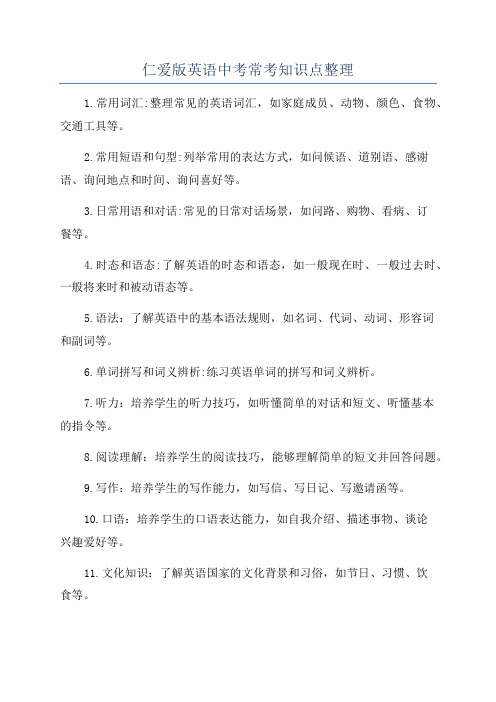
仁爱版英语中考常考知识点整理
1.常用词汇:整理常见的英语词汇,如家庭成员、动物、颜色、食物、交通工具等。
2.常用短语和句型:列举常用的表达方式,如问候语、道别语、感谢语、询问地点和时间、询问喜好等。
3.日常用语和对话:常见的日常对话场景,如问路、购物、看病、订
餐等。
4.时态和语态:了解英语的时态和语态,如一般现在时、一般过去时、一般将来时和被动语态等。
5.语法:了解英语中的基本语法规则,如名词、代词、动词、形容词
和副词等。
6.单词拼写和词义辨析:练习英语单词的拼写和词义辨析。
7.听力:培养学生的听力技巧,如听懂简单的对话和短文、听懂基本
的指令等。
8.阅读理解:培养学生的阅读技巧,能够理解简单的短文并回答问题。
9.写作:培养学生的写作能力,如写信、写日记、写邀请函等。
10.口语:培养学生的口语表达能力,如自我介绍、描述事物、谈论
兴趣爱好等。
11.文化知识:了解英语国家的文化背景和习俗,如节日、习惯、饮
食等。
总的来说,仁爱版英语中考考察的知识点涵盖了词汇、语法、听力、阅读、写作和口语等方面。
学生除了掌握这些知识点外,还需要通过大量的练习和实践来提升自己的英语能力。
仁爱版九年级unit单元语法知识点总复习有对应习题及答案
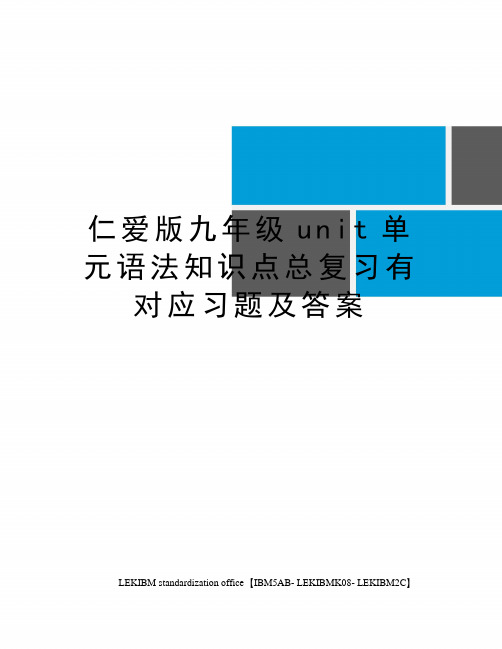
仁爱版九年级u n i t单元语法知识点总复习有对应习题及答案LEKIBM standardization office【IBM5AB- LEKIBMK08- LEKIBM2C】九年级英语Unit1单元归纳复习及相应课堂习题(含每个topic作文)1. Have/has been to, have/has gone to 和 have/has been in的区别主语+have/has been to + 地点“去过某地”(已返回)1 主语+have/has gone to +地点“去了某地”(未回来)主语+have/has been in +地点+for +段时间(待在某地,动作可以延长一定时间,后面常接段的时间)She has been in Japan for 2 year.She has been to Japan. She has gone to Japan.▲地点是名词须接to ,如果地点是副词则不接to。
Tom has been there.▲对地点提问用:where2.频度副词already,yet ,just,ever,never,在现在完成时中的作用3.4.(1)already 用在肯定句,用与句中,句尾均可,“已经”5.I’ve finished my homework already. I’ve already finished my homework .6.(2)yet 用于否定句或疑问句,“还”,用于句末。
在现在完成时的用法中,肯定句常用already,改用否定句和一般疑问句时常把already改为 yet(放句末)。
I have already found him.Have you found him yet(3)Just位于谓语动词前。
“刚刚”(也可以用于一般现在时,过去时态) He has just come back from France.(4) ever 多用与一般疑问句,否定句和条件状语从句中,“曾经”Have you ever been to France No, I haven’t. /Yes,I have.If you ever happen to come here ,be sure to visit us.(5)never 多用于否定的陈述句中,“从不……” (反义词是ever)I have never travelled on a plane.(变成一般疑问句)Have you ever travelled on a plane?He is never late for school. (它还可以用于其他时态中)(6)before 做副词时,”从前“,句中谓语常用现在完成时和过去时。
(仁爱版)七年级英语总复习Unit-2知识点、练习和参考答案
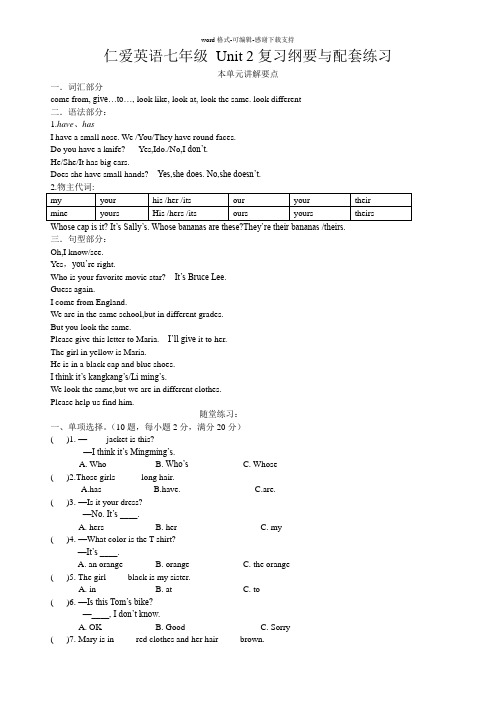
仁爱英语七年级Unit 2复习纲要与配套练习本单元讲解要点一.词汇部分come from, give…to…, look like, look at, look the same. look different二.语法部分:1.have、hasI have a small nose. We /You/They have round faces.Do you have a knife? Yes,Ido./No,I don’t.He/She/It has big ears.Does she have small hands? Yes,she does. No,she doesn’t.Whose cap is it? It’s Sally’s. Whose bananas are these?They’re their bananas /theirs.三.句型部分:Oh,I know/see.Yes,you’re right.Who is your favorite movie star? It’s Bruce Lee.Guess again.I come from England.We are in the same school,but in different grades.But you look the same.Please give this letter to Maria. I’ll give it to her.The girl in yellow is Maria.He is in a black cap and blue shoes.I think it’s kangkang’s/Li ming’s.We look the same,but we are in different clothes.Please help us find him.随堂练习:一、单项选择。
(10题,每小题2分,满分20分)( )1. —____ jacket is this?—I think it’s Mingming’s.A. WhoB. Who’sC. Whose( )2.Those girls _____ long hair.A.hasB.have.C.are.( )3. —Is it your dress?—No. It’s ____.A. hersB. herC. my( )4. —What color is the T-shirt?—It’s ____.A. an orangeB. orangeC. the orange( )5. The girl ____ black is my sister.A. inB. atC. to( )6. —Is this Tom’s bike?—____, I don’t know.A. OKB. GoodC. Sorry( )7. Mary is in ____ red clothes and her hair ____ brown.A. /; isB. a; areC. /; are( )8. —Do you look like your sister?—No, we ____.A. look the sameB. look differentC. look like( )9. —You are nice in this dress.—____A. It’s right.B. No, it isn’t.C. Thank you.( )10.-What does your brother look like?-She has _____nose.A.a big red B .a red big C.red big二、词汇运用。
仁爱版初中英语单词汇总(默写专用)

仁爱版初中英语单词汇总(默写专⽤)仁爱七上单词表Unit OneTopic 1好的,良好的___________早晨,上午___________欢迎,受欢迎的___________到,对,向___________中国___________谢谢,感谢___________你,你们___________喂,你好___________我___________是___________我是___________是___________是,好,同意___________不,不是___________不,没___________哦,啊___________令⼈愉快的,漂亮的___________相识,结识,遇见___________也,还,⼜,太___________喂,你好___________⼥⼠,⼩姐___________这个,这___________是___________先⽣___________看见,看到,明⽩___________我的___________妈妈___________⽼师,教师,教员___________怎样,如何,多么___________做,⼲,⾏动___________健康的,美好的,晴朗的___________再见,再会___________再见___________下午,午后___________和,⼜,⽽___________好,对,不错___________以后,后来,晚些的___________ Topic 2原谅,宽恕___________我___________劳驾,请原谅___________什么,怎么样___________你的,你们的___________名字,姓名,名称___________在哪⾥,往哪⾥___________来⾃。
从___________加拿⼤___________英格兰___________这(那)个,这(那)些___________美国___________她___________他___________isn’t=___________⽇本___________我们___________谁___________他/她/它们,⼈们aren’t=______________________古巴___________零___________⼀___________⼆___________三___________四___________五六___________七___________⼋___________九___________⼗___________电话(机),打电话___________号码,数___________它___________Topic 3⼗⼀___________⼗⼆___________⼗三___________⼗四___________⼗五___________⼗六___________⼗七___________⼗⼋___________⼗九___________⼆⼗___________年___________…岁的,⽼的,旧的___________……岁___________……多少岁___________班级,课___________在…⾥(内,上),⽤…___________年级___________那,那个___________英语,英国的,英国⼈的___________⽤英语表达___________⼀(个,件…)___________橡⽪擦,⿊板擦___________拼写___________⼀(个,件…)___________地图___________可能的,能够;可以___________请,使⼈⾼兴/满意___________铅笔___________苹果___________双的。
Unit 5 topic 2 总复习课件 仁爱版英语七年级下册
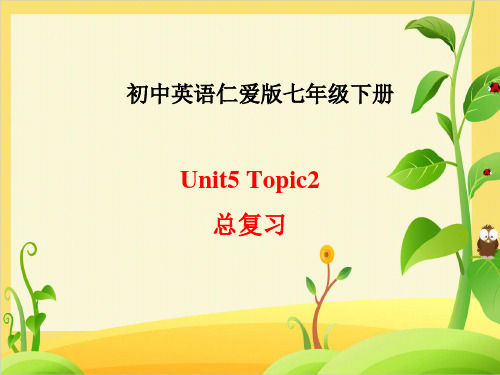
KK: Thank you all the same. Bye! Girl: Bye!
句型连连看
句型连连看
重点句子有哪些?看谁说得多!
词汇集中营
单词填空,考查综合运用能力!
LM: Excuse me, may I borrow some Englishworkbooks? Girl: Of course . Many students are using them. ( The girl looks for the books on the shelves.)
6. 在教师办公室 6. in the teachers’ office
7. 在游泳池
7. in theswimming pool
8. 在操场
8. on the playground
9. 在体育馆/图书馆/实验室/餐厅
9. in the gym / library/ lab/ dining hall 10. 打扫卫生
(1) We need to go shopping. There is __A___ juice left in the fridge.
A. little
B. few
C. many
D. much
【解析】few和many修饰可数名词复数,little和much修饰不可数名词。根据语境可
知冰箱里几乎没有果汁了,juice是不可数名词,用little修饰。故答案为A。
快速回忆所学单词,看谁说得又快又准!
2. 操场 playground 3. 实验室 lab
八年级英语仁爱版上册复习资料
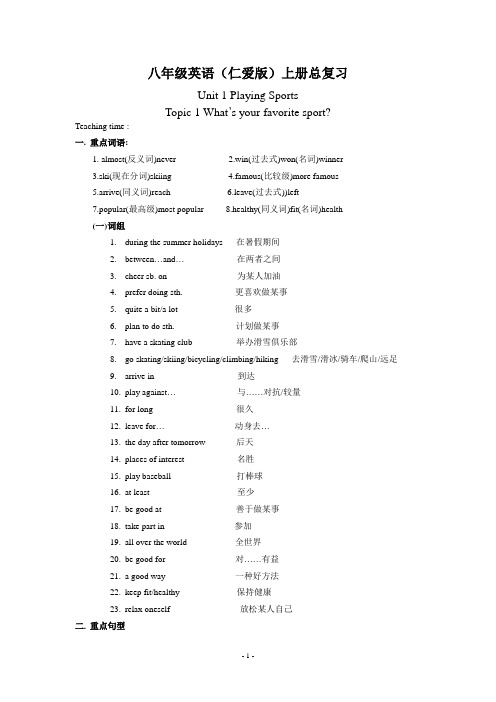
八年级英语(仁爱版)上册总复习Unit 1 Playing SportsTopic 1 What’s your favorite sport?Teaching time :一.重点词语:1. almost(反义词)never2.win(过去式)won(名词)winner3.ski(现在分词)skiing4.famous(比较级)more famous5.arrive(同义词)reach6.leave(过去式))left7.popular(最高级)most popular 8.healthy(同义词)fit(名词)health(一)词组1.during the summer holidays 在暑假期间2.between…and…在两者之间3.cheer sb. on 为某人加油4.prefer doing sth. 更喜欢做某事5.quite a bit/a lot 很多6.plan to do sth. 计划做某事7.have a skating club 举办滑雪俱乐部8.go skating/skiing/bicycling/climbing/hiking 去滑雪/滑冰/骑车/爬山/远足9.arrive in 到达10.play against…与……对抗/较量11.for long 很久12.leave for…动身去…13.the day after tomorrow 后天14.places of interest 名胜15.play baseball 打棒球16.at least 至少17.be good at 善于做某事18.take part in 参加19.all over the world 全世界20.be good for 对……有益21.a good way 一种好方法22.keep fit/healthy 保持健康23.relax oneself 放松某人自己二.重点句型1.What’s your favorite sport? = What sport do you like best? 你最喜爱的运动是什么?2.Which sport do you prefer? = Which sport do you like better? 你更喜欢什么运动?I prefer skating. = I like skating better. 我更喜欢滑雪.3.Do you skate much? = Do you often skate? 你常滑雪吗?4.She spends at least half an hour in the gym every day. 每天她至少花半小时在体育馆.5.She plays baseball pretty well and she is also good at jumping.她棒球打得相当好而且擅长于跳.6.What kind of sports do you like? = Which sport do you like? 你喜欢哪种运动?三.重点语言点1.see sb. do sth “看见某人做了某事”强调动作的全过程,常与every day; often等连用.see sb. doing sth. “看见某人正在做某事”强调动作正在进行.如: I saw you play basketball almost every day during the summer holidays.I often see him draw pictures near the river. 我常看见她在河边画画.I saw her go across the street. 我看见她过了马路I saw her going across the street. 我看见她正在过马路.[类似的有watch,hear,feel 等这类感观动词.]2.join sb. 表示“加入某人的行列”“和某人在一起”join + 组织表示“加入某个组织”take part in 表示“参加/出席某个活动”如: Will you join us?I will join the skiing club.She is planning to take part in the high jump.3.arrive in + 大地点arrive at + 小地点get to + 地点= reach + 地点如: My uncle arrived in Beijing yesterday.I arrived at the Great Wall. = I got to the Great Wall. = I reached the Great Wall.注意: reach here/there/home = get here/there/home = arrive here/there/home4.leave…离开……leave for…动身去…/离开到…如: They are leaving Beijing tomorrow. 明天他们要离开北京.They are leaving for Japan the day after tomorrow. 后天他们要前往日本.5.a few “几个;一些”修饰可数名词a little “一点点”修饰不数名词如: There are a few eggs in the basket.There is a little water in the bottle.6.how long 表示“多久(时间)”; 提问时间段.how often 表示“多常; 多久一次”; 提问时间的频率.如: They will stay in Beijing for a week. →How long will they stay in Beijing?He plays basketball twice a week. →How often does he play basketball?7.be good at (doing) sth. = do well in (doing) sth.擅长于(做)某事如: She is good at (playing) baseball. = She does well in (playing) baseball.8.make sth/sb + adj.使某物(某人)在某种状态keep …sth/sb + adj. 保持某物(某人)在某种状态如: Playing soccer can make your body strong.Swimming can help to keep your heart and lungs healthy.四.重点语法一般将来时:(一)be going to 结构: ①表示主语进行某一将来行动的打算、意图。
仁爱英语九年级上册知识点总结复习专用
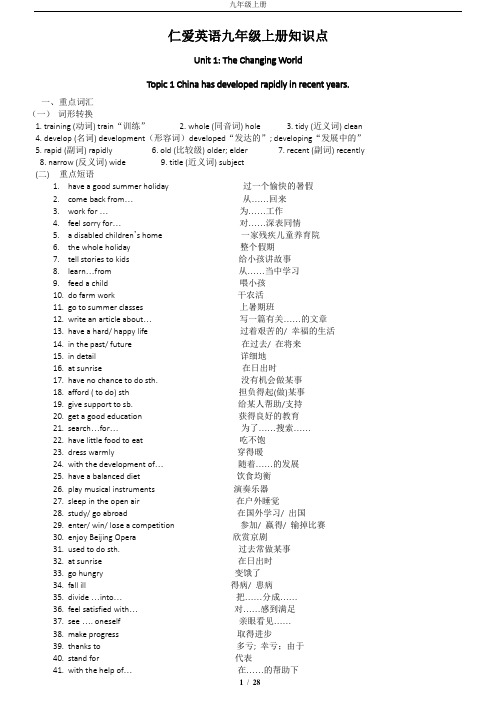
仁爱英语九年级上册知识点Unit 1: The Changing WorldTopic 1 China has developed rapidly in recent years.一、重点词汇(一)词形转换1. training (动词) train“训练”2. whole (同音词) hole3. tidy (近义词) clean4. develop (名词) development(形容词)developed“发达的”; developing“发展中的”5. rapid (副词) rapidly6. old (比较级) older; elder7. recent (副词) recently8. narrow (反义词) wide 9. title (近义词) subject(二)重点短语1.have a good summer holiday 过一个愉快的暑假e back from…从……回来3.work for …为……工作4.feel sorry for…对……深表同情5. a disabled children’s home 一家残疾儿童养育院6.the whole holiday 整个假期7.tell stories to kids 给小孩讲故事8.learn…from 从……当中学习9.feed a child 喂小孩10.do farm work 干农活11.go to summer classes 上暑期班12.write an article about…写一篇有关……的文章13.have a hard/ happy life 过着艰苦的/ 幸福的生活14.in the past/ future 在过去/ 在将来15.in detail 详细地16.at sunrise 在日出时17.have no chance to do sth. 没有机会做某事18.afford ( to do) sth 担负得起(做)某事19.give support to sb. 给某人帮助/支持20.get a good education 获得良好的教育21.search…for…为了……搜索……22.have little food to eat 吃不饱23.dress warmly 穿得暖24.with the development of…随着……的发展25.have a balanced diet 饮食均衡26.play musical instruments 演奏乐器27.sleep in the open air 在户外睡觉28.study/ go abroad 在国外学习/ 出国29.enter/ win/ lose a competition 参加/ 赢得/ 输掉比赛30.enjoy Beijing Opera 欣赏京剧ed to do sth. 过去常做某事32.at sunrise 在日出时33.go hungry 变饿了34.fall ill 得病/ 患病35.divide …into…把……分成……36.feel satisfied with…对……感到满足37.see …. oneself 亲眼看见……38.make progress 取得进步39.thanks to 多亏; 幸亏;由于40.stand for 代表41.with the help of…在……的帮助下42.draw up an outline 拟定提纲三、重点句型1.You have just come back from your hometown. 你刚刚从你的家乡返回。
初中英语总复习材料(仁爱版)
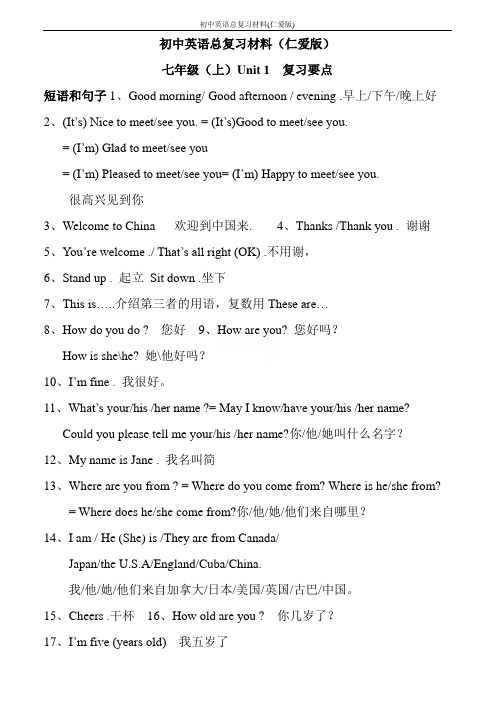
初中英语总复习材料(仁爱版)七年级(上)Unit 1 复习要点短语和句子1、Good morning/ Good afternoon / evening .早上/下午/晚上好2、(It’s) Nice to meet/see you. = (It’s)Good to meet/see you.= (I’m) Glad to meet/see you= (I’m) Pleased to meet/see you= (I’m) Happy to meet/see you.很高兴见到你3、Welcome to China 欢迎到中国来.4、Thanks /Thank you . 谢谢5、You’re welcome ./ That’s all right (OK) .不用谢,6、Stand up . 起立Sit down .坐下7、This is…..介绍第三者的用语,复数用These are…8、How do you do ? 您好9、How are you? 您好吗?How is she\he? 她\他好吗?10、I’m fine . 我很好。
11、What’s your/his /her name ?= May I know/have your/his /her name?Could you please tell me your/his /her name?你/他/她叫什么名字?12、My name is Jane . 我名叫简13、Where are you from ? = Where do you come from? Where is he/she from?= Where does he/she come from?你/他/她/他们来自哪里?14、I am / He (She) is /They are from Canada/Japan/the U.S.A/England/Cuba/China.我/他/她/他们来自加拿大/日本/美国/英国/古巴/中国。
(仁爱版)七年级英语总复习Unit 1知识点、练习和参考答案
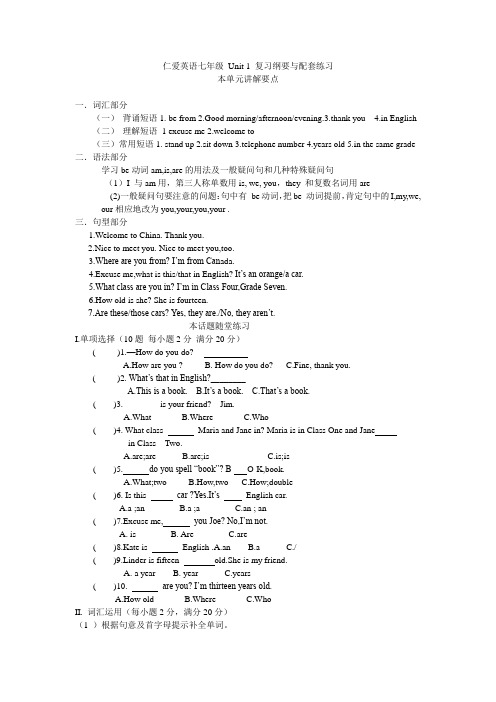
仁爱英语七年级Unit 1 复习纲要与配套练习本单元讲解要点一.词汇部分(一)背诵短语1. be from 2.Good morning/afternoon/evening.3.thank you 4.in English (二)理解短语 1 excuse me 2.welcome to(三)常用短语1. stand up 2.sit down 3.telephone number 4.years old 5.in the same grade 二.语法部分学习be动词am,is,are的用法及一般疑问句和几种特殊疑问句(1)I 与am用,第三人称单数用is, we, you,they 和复数名词用are(2)一般疑问句要注意的问题:句中有be动词,把be 动词提前,肯定句中的I,my,we,our相应地改为you,your,you,your .三.句型部分1.Welcome to China. Thank you.2.Nice to meet you. Nice to meet you,too.3.Where are you from? I’m from Can ada.4.Excuse me,what is this/that in English? It’s an orange/a car.5.What class are you in? I’m in Class Four,Grade Seven.6.How old is she? She is fourteen.7.Are these/those cars? Yes, they are./No, they aren’t.本话题随堂练习I.单项选择(10题每小题2分满分20分)( )1.—How do you do?--A.How are you ?B. How do you do?C.Fine, thank you.( )2. What’s that in English?________A.This is a book.B.It’s a book.C.That’s a book.( )3. ________is your friend? Jim.A.WhatB.WhereC.Who( )4. What class Maria and Jane in? Maria is in Class One and Janein Class Two.A.are;areB.are;isC.is;is( )5. do you spell “book”? B- O-K,book.A.What;twoB.How,twoC.How;double( )6. Is this car ?Yes.It’s English car.A.a ;anB.a ;aC.an ; an( )7.Excuse me, you Joe? No,I’m not.A. isB. AreC.are( )8.Kate is English .A.an B.a C./( )9.Linder is fifteen old.She is my friend.A. a yearB. yearC.years( )10. are you? I’m thirteen years old.A.How oldB.WhereC.WhoII. 词汇运用(每小题2分,满分20分)(1 )根据句意及首字母提示补全单词。
仁爱版七年级英语上册总复习完整版
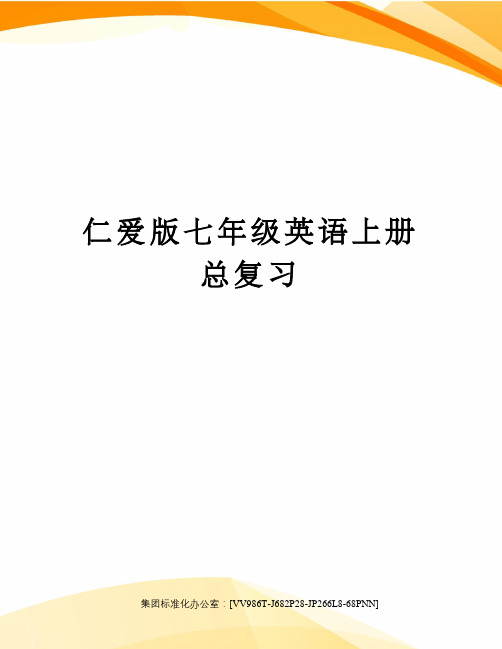
仁爱版七年级英语上册总复习集团标准化办公室:[VV986T-J682P28-JP266L8-68PNN]英语七年级上册知识点归纳Unit11、Goodmorning/afternoon/evening早上/下午/晚上好Goodnight晚安(晚上告别)2、glad/nicetomeet/seeyou见到你很高兴(回答也一样)3、welcometo+地点欢迎来到……(回答:Thankyou或者Thanks)4、let’s+V让我们做……(原)5、standup起立sitdown坐下6、thisis-----这是……(用于介绍第三者的用语)7、Howdoyoudo你好(回答也是:Howdoyoudo)8、Howareyou你好吗Fine,thankyou.andyou很好;谢谢;你呢I’mOK/I’mfine,too.我也很好。
9、seeyou=seeyoulater=seeyousoon=good-bye再见10、excuseme打扰一下;请问11、I’m-----=mynameis----我是……12、befrom=comefrom来自13、inEnglish用英语14、CanyouspellitYes/No你能拼写它吗能/不能15、That’sOK/That’sallright/You’rewelcome/Notatall不用谢16、……yearsold?……岁17、telephonenumber电话号码QQnumberQQ号码IDnumber身份证18、thesame(相同的)反义词是different(不同的)例:Weareinthesamegrade,butweareindifferentclasses.句型:1.Whatisyourname你的名字是什么2.Where+be+主语+from某人来自于哪里(回答:主语+be+地点)Whereareyoufrom?Iamfromquanzhou.3.Howold+be+主语某人几岁(回答:主语+be+数字)例:Howoldareyou?I’mforteen.4.Whatisyourtelephonenumber你的电话号码是多少(回答:Mytelephonenumberis----或者It’s-------)注意:读出号码的时候要逐个读出。
(完整版)仁爱英语中考九年级全一册知识点总复习整理版

仁爱英语中考总复习----------------知识点重点难点梳理(九年级上、下册)九年级(上)Unit 1Unit 1 Topic 1短语take photos 照相so…that 如此……以致于have /has been to 到过an English training school 一所英语培训学校在地take part in 参加 a disabled child 残疾儿童learn…from 从……学会around the world 全世界in the past 在过去in detail 详细地no chance 没机会make money 赚钱give support to 为某人提供帮助get a good education 得到好的教育have/has gone to 到过by the way 顺便问一下search the internet 上网used to be 去过曾经是with the development of China 随着中国的发展at sunrise 日出时grow cotton 种植棉花go hungry 变得很饿shout at 对…… 喊叫divide…into 把……分成send…to 把……送到…… at that time 在那时feel satisfied with 对……满意be used to do sth. 被用来做…… more than 超过during the vacation 在假期期间living condition 生活条件in recent years 在近几年make progress 取得进步live in present 立足现在dream about 展望未来happen to somebody/something ( 事情)发生在……身上,临到……头上happen to do something 碰巧thanks to 因为……,the capital of China中国首都host the 2008 Olympic Games 举办2008奥运会stand for 代表as well 也prepare for为…… 做准备taken place 发生with the help of 在……帮助下1.spend time (in) doing something 花费时间做某事2.see somebody doing something 看见某人做某事3.There goes the bell. 铃响了。
仁爱版七年级英语下册总复习重点短语和句型

仁爱版七年级下英语总复习材料Unit 5 Our School LifeTopic 1 how do you usually go to school ?1.at the school gate 在学校大门口2.Happy New Year! 新年快乐3.The same to you! 也同样祝你--- ---4.looks very nice! 看起来漂亮e to school 来上学e by bike= ride(s) a bike 骑自行车7.go by subway=take(s) the subway= in asubway乘地铁8.go by bus=take (s) a bus / in a bus / on abus 乘公共汽车9.by plane / by air /in a plane / on a plane乘飞机10.by car /in a car / take a car 坐小汽车11.by train / in a train / on a train / take atrain乘火车12.by ship/by boat / on a ship/boat / take theship 坐船13.go on foot=walk to 步行14.walk to school 走路上学15.watch TV 看电视16.do one`s homework 做家庭作业17.see a movie 看电影18.Good evening 晚上好19.want to do sth 想要做某事20.what time 什么时间21.get up起床22.on weekdays 周末23.at about six o’clock 在大约六点钟e on 快点25.It`s time for class 该上课了26.It`s time to have class 该上课了27.know about 了解--- --- 的情况28.school life 学校生活29.American students 美国学生30.take a yellow school bus 乘一辆黄色的校车31.have/has lunch 吃午餐32.at school 在学校,在上学33.eat out外出吃饭,上馆子34.on school days 在校期间35.have a short rest休息一会儿36.after lunch午餐后37.after supper/after dinner 晚饭后38.after class下课后39.after school放学后40.listen to music 听音乐41.read books看书42.go to the park 去公园43.go to the zoo去动物园44.go to the library去图书馆45.go to school去上学46.go to work去上班47.school is over 放学了48.class is over 下课了49.in one`s free/spare time50.在某人的业余时间里51.play basketball 打篮球52.play soccer 踢足球53.go swimming 去游泳54.go shopping 去买东西55.go fishing 去钓鱼56.go skating 去滑旱冰57.go skiing 去滑冰58.go climbing mountains 去爬山59.go hiking 去远足60.how often多久一次61.ball games 球赛62.have ball games 举行球赛63.four times a year 每年四次64.meet friends 见朋友65.once a week 每周一次66.twice a week 每周两次67.three times a week 每周三次68.Work must come first! 工作〔学习〕必须放在第一69.twenty past six 六点过二十分70.at twenty past six 在六点二十分71.have / has breakfast 吃早餐72.have / has lunch 吃午餐73.have / has supper 吃晚餐74.have / has dinner 吃晚餐75.half past seven 七点半76. a quarter past five 五点过十五分77.get home 到家78.go / goes to bed 上床睡觉79. a quarter to ten 十点过十五分80.drive a car 开小汽车81.the Great Wall 长城Topic 2 He is playing soccer on theplaygroundputer room 电脑室2.dining hall 食堂3.teachers` office 教师办公室4.classroom building 教学楼5.swimming pool 游泳池6.in the library 在图书馆7.in the dormitory 在宿舍里8.in the dining hall 在食堂里9.on the playground 在操场上10.at the moment = now此刻,现在11.clean the dormitory打扫宿舍12.clean the bedroom 打扫卧室13.clean the classroom 打扫教室14.clean the blackboard擦黑板15.make cards 制作卡片16.Would you like to --- --- ?17.你想做--- --- 吗?18.Good idea!好主意19.See you soon 一会儿见20.play computer games 玩电脑游戏21.May I borrow --- --- 我可以借--- ---吗?22. a few几个,一些23.Ren’ai Project English workbooks 仁爱英语练习册24.of course = sure = certainly 当然25.on time 准时26.in time 及时27.many students 许多学生28.do well in= be good at sth / doing sth在--- ---做得好29.do better in 在--- --- 做得更好30.31.on the shelf 在书架上32.return = give back 归还33.It’s a pleasure 不用谢34.Thank you all the same 还是要谢谢你35.lost and found 失物招领处36.looking for 寻找37.some money 一些钱38. a picture of my family 一张全家福照片39.thank you all the same 还是要谢谢你40.school student card 学生卡41. a pair of pants 一条裤子42. a pair of shoes 一双鞋43.two pairs of shoes 两双鞋44.singing in the room 在房间里唱歌45.dancing in the gym 在体育馆跳舞46.swimming in the gym 在体育馆游泳47.show sb around 带领某人参观48.in the center of= in the middle of 在------ 的中间,在--- --- 的中央49.on the left 在左边50.on the right 在右边51.next to 在--- --- 隔壁,在--- ---旁边,紧挨看,靠近52.at the back of 在--- ---后部,在--- --- 后53.near the playground 在操场的附近54.in the gym 在体育馆里,在健身房里55.in the swimming pool在游泳池里56.talk about their families 谈论他们家庭57.Attention, please ! 请注意!58.between --- and --在--- --- 和--- --- 之间59.stamp collection show 集邮展60.school hall 学校大厅61.every Saturday 每个星期六62.he is running 他在跑步63.in picture 1 在第一张照片里64.in picture 2 在第二张照片里65.look(looks) happy 看起来高兴66.love swimming 喜欢游泳67.talk to a Japanese girl和一个日本女孩交谈68.play the guitar 弹吉它69.in the classroom 在教室里70.in the office 在办公室里71.in the dormitory 在宿舍里72.on the playground 在操场上Topic 3 our school is very interesting1.What day 用来提问“星期几”2.have a music class 上一节音乐课3.at ten o`clock 十点钟4. a quarter to eleven 十点四十五分5.have a biology lesson上一节生物课6.have a geography 上一节地理课7.have a P.E. lesson 上一节体育课8.have an art lesson 上一节美术课9.outdoor activities 户外活动10.how many lessons 多少节课11.every week 每周12.singing and dancing唱歌跳舞13.drawing pictures 画画14.Working on math problems 做数学题15.speaking English 说英语16.learning about the past 了解过去17.an English book 一本英语书18.What do you think of it = How do youlike it ? 你觉得它怎么样?19.Difficult and boring 难学而且乏味20.Which subject 哪一门课21.Easy and interesting 容易又有趣22.Favorite subject 最喜欢的科目23.My school life 我的学校生活24.At school 在学校里,在上学25.Be friendly to sb = be kind to sb 对某人友好26.In the morning 在上午,在早晨27.In the afternoon 在下午28.I aften speak English with my classmates我经常和我的同学说英语29.After school 放学后30.Play basketball with my classmates和同学们打篮球31.On the playground 在操场上32.Every Tuesday 每周二33.Every Thursday 每周四34.school newpaper 校报35.School Time 校园时代36.And so on 等等37.Science Today 当代科学38.Thank sb for doing sth 感谢某人做了某事39.best wishes 致以美好的祝愿40.read stories 看故事书41.have a biology class 上生物课42.have breakfast 吃早饭43.run on the playground 在操场上跑步44.have a physics class上物理课45.watch animals 欣赏动物46.play soccer at school 在学校踢足球47.read a book at home 在家看书48.have dinner in the school dinning hall在学校食堂吃晚饭49.have dinner at home 在家吃晚饭Unit 6 Our Local AreaTopic 1 Is there a sofa in your study?1.On the second floor 在二楼2.Why not =Why don`t you为什么不--- --- ?3.Go upstairs 上楼4.Go downstairs 下楼5.Have a look 看一看6. A moment later 过了一会儿e in ,please 请进8.So many books 这么多的书9.On the shelf 在书架上10.You have a nice study你的书真漂亮!11.Dining room 餐厅12.Living room 客厅13.On the first floor 在一楼14.Cousins 表姐妹,表兄弟15.In the front of the house 在房子前面16.In the kitchen 在厨房17.In the study 在书房18.In the dinning room 在餐厅19.In the bedroom 在卧室20.In the garden 在花园21.Behind the door 在门后面22.Play with his pet dog和他的宠物狗玩耍23.Play games 玩游戏24.Clean the car 清洗小汽车25.Read books 看书26.Have dinner 吃饭27.Talk about 谈论28.Near my desk 在我桌子旁29.On your desk 在你桌子上30.So on 等等31.My family photo 我的全家福照片32.On the wall 在墙上33.Put them away 请把它们收起来放好34.Put it away,please把它/它们收起来放好35.Look after = take care of 照看,照顾36.In front the house 房子前面37.In the bottle 瓶子里38.Near the window 窗户边39.In the glass 杯子里40.Model planes 飞机模型41.Under the bed 床下42.How many pairs 多少双43.In the tree 树上44.On the tree 树上45.On the shelf 书架上46.On the river 河里47. A small garden 一个小花园48.Many beautiful flowers 许多美丽的花49.In the garden 花园里50. A big tree 一棵大树51.Under the tree 在树下52.Very beautiful 非常漂亮53. A large living room 一个在客厅54. A dining room 一个餐厅55. A kitchen 一个厨房56. A bathroom 一个卫生间57.I like watching TV in the living room我喜欢在客厅里看电视58.I love playing on the computer in thestudy我喜欢在书房里玩电脑59.In the drawer 在抽屉里60.On the chair 在椅子上61.Under the chair 在椅子下62.In picture A 图A里63.In picture B 图B里64.On the walls 在墙上65.In 在--- --- 里面66.On 在--- --- 上面67.Behind 在--- --- 下面68.Near 在--- --- 附近69.Next to 在--- --- 旁边70.In the front of 在--- --- 前面71.Don`t put it / them here 别把它/它们放在这儿72.Write a letter 写一封信73.Describe different rooms in your home描述你家不同的房间74.The things around your home 房子周围的事物75.I`m very glad to 我很高兴76.Get a letter from sb= hear from sb 收到某人的来信77.Tell sb about sth 告诉某人关于某事78.Tell sb to do sth 告诉某人做某事79.Tell sb sth 告诉某人某事Topic 2 What`s your home like?1.What`s your home like? 你家是什么样的?2.An apartment building 一座公寓3. A town house 城镇住宅4.Live with sb 和某从居住在一起5.Your grandparents 你的爷爷和奶奶6. A big farmhouse 农舍7.In the country 在农村8.Look for 寻找9.Let`s help him 我们去帮助他吧10.In our group 在我们小组11.For rent 出租12.Wanted 求租13.Small apartment for students小型学生公寓14.¥850 a month 每月850元15.Call Ms. Zhang 联系张女士16.House with three bedrooms 一套三居室的房子17.House with furniture for a family of three适合三口之家,家具齐全的房子18.Looking for a quiet double room 求租一间安静的双人间under ¥300 per month 月租低于300元19.Apartment for a family of two 适合两口之家的公寓20.House with four bedrooms 四居室21.Quiet double room 安静的双人间22.Excuse me 打搅了,打搅一下,劳驾,23.Your new neighbor 你的新邻居24.I`m looking for a store我在找一家商店25.On the street corner 在街道拐角处26.Post office 邮局27.Bookstore 书店28.Museum 博物馆29.Parking lot 停车场30.Supermarket 超市31.Hospital 医院32.Bank 银行33.Train station 火车站34.Park cars 停车35.Keep money 存钱36.Take trains 乘火车37.See a doctor 看医生38.Buy food 买食物39.Mail letters 邮寄信40.Buy books 买书41.Keep and show things保存和陈列物品42.Bookstored 书店43.Restaurant ['restərənt] 饭店44.I`m afaid it`s too loud 恐怕声音有点儿大45.I`m really sorry about that 十分抱歉46.At the end of 、Road 在、、、路的尽头47.On the right 在右边48. A tall tree 一棵大树49.Lot of = lots of 许多50.Tall buildings 高楼51.Small gardens 小花园52.Close to 离--- --- 近,紧挨着的53.Far from 离--- --- 远54.Not far from 离--- --- 不远55.Call it for help 打向它求助56.How is the community? 社区是什么样的?57.Living near your home 住在你家附近58.Do you like living there?59.This is linda speaking. 我是琳达60.61.What`s the matter? 有什么事吗?62.There is something wrong with =Something is wrong with某人/某物出问题,有毛病了63.Right now 立刻,马上64.From--- to--- 从--- --- 到--- ---65.The traffic is heavy 交通拥挤66.The cost of living is high生活费用高67.Houses with big yards带大院子的房子68. A house with a garden 有花园的房子Topic 3 How can I get to the bookstore?1.Go up this street to the end 沿着这条街一直走到尽头2.On your left 在你左边3.How can I get to--?我怎样才能去--- --- ?4.Go along Xinhuan Street 沿着新华路走5.Turn left at the first street 在第一条街口向左转6.Go across the bridge 穿过桥7.It`s about one hundre meters along on theright 顺着右边走大约100米〔就到〕8.Which is the way to--- ? 哪一条是到--- --- 路?9.The post office 邮局10.I`m new here 我对这儿不熟11.On 在--- --- 上面12.On the corner of 在--- --- 拐角处13.Across from 在--- --- 正对面14.Between --- and --在--- --- 和--- ---之间15.Near the bridge 在桥的附近16.Turn left and walk on 向左拐并一直往前走17.You can`t miss it 你不会错过的18.Beitai Road 北台路19.Be --- away from 离--- --- 远20.Need to do sth 需要做某事21.Take bus No.718 乘坐718路车22.Change to the No.108 bus at AnzhenBridge 在安贞桥换乘108路车23.The way to Shuanxiu Garden 去双秀花园的路24.At Liuli Bridge 六里桥25.How far “多远”,问距离。
仁爱版初中英语资料

仁爱版初中英语资料Education is a fundamental aspect of human development, and the quality of teaching materials plays a crucial role in shaping the learning experience of students. When it comes to middle school English education, the importance of compassionate and inclusive teaching materials cannot be overstated. These materials not only facilitate the acquisition of language skills but also foster the development of empathy, understanding, and respect for diverse perspectives.One of the primary objectives of compassionate English teaching materials is to expose students to a wide range of cultural experiences and narratives. By incorporating stories, poems, and articles that reflect the lived experiences of individuals from different backgrounds, students are able to gain a deeper appreciation for the richness and diversity of the human experience. This exposure can challenge preconceived notions, break down stereotypes, and encourage students to approach the world with an open and curious mindset.Moreover, compassionate teaching materials should prioritize the inclusion of diverse voices and perspectives. This means ensuring that the texts, characters, and themes represented in the curriculum reflect the diversity of the student population and the broader global community. By doing so, students can see themselves reflected in the learning materials, fostering a sense of belonging and validation. Additionally, exposure to diverse perspectives can broaden students' horizons, cultivate empathy, and prepare them to navigate an increasingly interconnected world.Another essential aspect of compassionate English teaching materials is the incorporation of social-emotional learning (SEL) components. SEL focuses on the development of skills such as self-awareness, self-management, social awareness, relationship skills, and responsible decision-making. By integrating SEL into the English curriculum, teachers can create learning experiences that not only enhance language proficiency but also support the holistic development of students.For instance, teaching materials that explore themes of kindness, empathy, and conflict resolution can help students navigate interpersonal challenges and foster positive relationships. Similarly, activities that encourage self-reflection and emotional expression can aid in the development of self-awareness and emotional regulation. By embedding these SEL elements into the Englishcurriculum, teachers can empower students to become more emotionally intelligent, resilient, and socially responsible individuals.Furthermore, compassionate English teaching materials should prioritize the use of inclusive and respectful language. This includes avoiding the use of biased or discriminatory terminology, as well as ensuring that the language used in the materials is sensitive to the diverse backgrounds and experiences of the students. By modeling the use of inclusive language, teachers can not only promote linguistic accuracy but also cultivate an environment of respect and understanding.Additionally, compassionate English teaching materials should incorporate opportunities for critical thinking and open-ended discussions. Rather than presenting information in a purely didactic manner, these materials should encourage students to engage with the content, ask questions, and explore multiple perspectives. This approach fosters the development of critical thinking skills, which are essential for navigating the complexities of the modern world.Moreover, compassionate English teaching materials should be designed with the diverse needs and learning styles of students in mind. This may involve the incorporation of multimodal learning resources, such as audiovisual materials, interactive activities, and hands-on learning experiences. By catering to the diverse learningpreferences of students, teachers can ensure that the curriculum is accessible and engaging for all learners.Finally, the development and implementation of compassionate English teaching materials should be a collaborative effort, involving input from a diverse range of stakeholders, including educators, students, families, and community members. By fostering this collaborative approach, the materials can be tailored to the specific needs and contexts of the learning community, ensuring that they are truly responsive to the unique experiences and perspectives of the students.In conclusion, the development and implementation of compassionate English teaching materials is a crucial step in creating a more inclusive and equitable educational landscape. By prioritizing the incorporation of diverse perspectives, social-emotional learning, inclusive language, critical thinking, and personalized learning experiences, these materials can empower students to become informed, empathetic, and responsible global citizens. As we strive to prepare our students for the challenges and opportunities of the21st century, the adoption of compassionate English teaching materials must be a central component of our educational mission.。
仁爱版英语八年级上册:Unit1Playingsportsunit1总复习
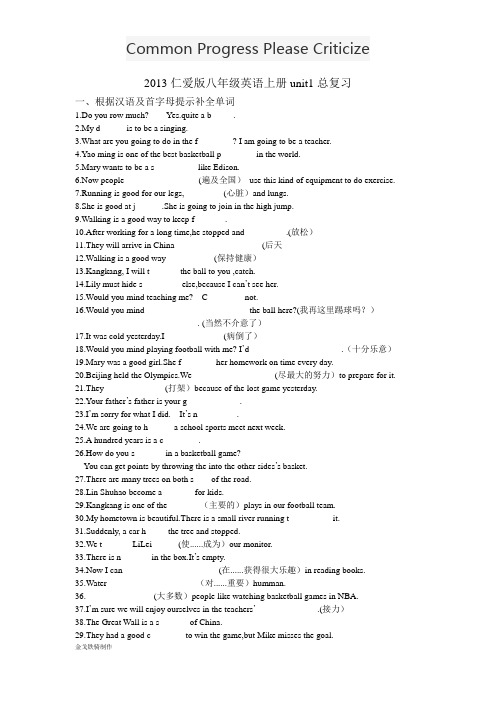
2013仁爱版八年级英语上册unit1总复习一、根据汉语及首字母提示补全单词1.Do you row much? Yes.quite a b_____.2.My d______is to be a singing.3.What are you going to do in the f________? I am going to be a teacher.4.Yao ming is one of the best basketball p________in the world.5.Mary wants to be a s__________like Edison.6.Now people_________________(遍及全国)use this kind of equipment to do exercise.7.Running is good for our legs,_________(心脏)and lungs.8.She is good at j______.She is going to join in the high jump.9.Walking is a good way to keep f_______.10.After working for a long time,he stopped and _________.(放松)11.They will arrive in China____________________(后天12.Walking is a good way___________(保持健康)13.Kangkang, I will t_______the ball to you ,catch.14.Lily must hide s_________else,because I can’t see her.15.Would you mind teaching me? C________ not.16.Would you mind_______ ________ ________the ball here?(我再这里踢球吗?)________ ________ ________. (当然不介意了)17.It was cold yesterday.I______ _______(病倒了)18.Would you mind playing football with me? I’d______ _______ _______.(十分乐意)19.Mary was a good girl.She f________her homework on time every day.20.Beijing held the Olympics.We______ _____ _______(尽最大的努力)to prepare for it.21.They______________(打架)because of the lost game yesterday.22.Your father’s father is your g____________.23.I’m sorry for what I did. It’s n_________.24.We are going to h______a school sports meet next week.25.A hundred years is a c________.26.How do you s_______in a basketball game?You can get points by throwing the into the other sides’s basket.27.There are many trees on both s____of the road.28.Lin Shuhao become a _______for kids.29.Kangkang is one of the _______(主要的)plays in our football team.30.My hometown is beautiful.There is a small river running t__________it.31.Suddenly, a car h_____the tree and stopped.32.We t_______LiLei______(使......成为)our monitor.33.There is n_______in the box.It’s empty.34.Now I can_______ _______ _______(在......获得很大乐趣)in reading books.35.Water ______ _______ ______(对......重要)humman.36._______ ________(大多数)people like watching basketball games in NBA.37.I’m sure we will enjoy ourselves in the teachers’______________.(接力)38.The Great Wall is a s_______of China.29.They had a good c________to win the game,but Mike misses the goal.30.______ _______(起先),he was in the calssroom.31.Do you know what UN_______ ________(代表)?32.We are going to London_____ _______ _______ ______(在.....之初)July.33.I’m not sure_______(是否)there are UFOs.34.Teamwork is more important t______a player’s good skills in a game.二、用括号中所给词的适当形式填空1.I see you________(read)English every day.2._________(skate)is her favourite sport.3.I spent three hours in ________(make) a kite.4.He did very ________(good)5.Eating more fruit is good for your_________(healthy)6.There is going to ______(be) a football match next week.7.The train________(arrive) at the station at this time every day.8.Do they go______(cycle)every Saturday?Yes,they do.9.We___________(have) an English party this weekend.I hope you can come.10.There ____________(be) a baseball match this afternoon.11.Our plane________(leave) at ten o’clock tonight.12._____you______(go) to my party next week?Yes I am.13.Our plane______(fly) to Beijing at ten tonight.14.The boy spends much time_______(play) computer games.15.My sister________(become) a teacher two years ago.16.James was from__________.He was a___________.(Canada)17.Thomas Edison ______many inventions.He was a great_____________.(invent)18.They are sure________(come) tonight.19.He enjoys________(read) books after supper.20.Jane keeps_______(send)an e-mail to her good friends every week.21.He will join in the ______(boy)800-meter race in the school sports meet.22.Mother feels tired after________(work) a day.She is sleeping now.23.Will you_______(play)the piano______(quiet)?It’s too noisy.Sorry,I________(try)to play it more quietly.24.Hello!Is that Mary? _________(speak)25.I finished_______(do) my homework just now.26.My mother bought a pair of _______(run) shoes for me.27.Lin Tao was so ________(excite) that he couldn’t sleep.28.He did_______(bad)in the high jump yesterday.29.I hope to have a chance_____(go)to London.30.Ling is the first time_______(come)to school every day.31.三、单项选择1.Li lei________bananas_______apples when he was a child.A.prefers;toB.prefer;toC.preferred;betterD.preferred;to2.I hope my good friend______to the party.A.will comeeesD.came3.My daughter is going to be a teacher when she________.A.growB.grewC.grows upD.grew up4.We are going to go fishing________the summer holiday.A.toB.duringC.atD.for5.There _______an English party next week.A.will have B,is going to have C.is going to be D.was going to be6.I often see the girls_____in the room.They’re very pleased.A.danceB.dancesC.dancingD.to dance7.Let’s go! Our class are having a basketball game against Class One.Really? Why not_______?A.to cheer on themB.cheer them onC.cheer on themD.to cheer them on8.Running every day_____me very healthy.A.makesB.makeC.to makeD.making9.Don’t worry. I’ll do my best____you when you are in danger.A.helpB.to helpC.helpingD.helps10.I’m not good at English,but I keep _____hard.A.studyB.to studyC.studyingD.studies11.The woman_______the boy.Because he broke her window with a ball.A.shouted atB.was happy withC.was sorry forD.asked for12.Herry is sure______to you.A.to writeB.that writeC.of writeD.about write13.Summer holiday is come.What is your plan______the holiday?A.toB.forC.withD.in14.How delicious the cake is!I’m glad you like it.Would you like to have _____oneA.anotherB.othersC.the otherD.other15.The bad weather stopped us from_______hiking.A.goB.goesC.to goD.going16.A large number od children_______watching TV.My son likes ,too.A.likesB.likeC.likedD.to like17.I left my keys in the room yesterday,so I had to get in______the window.A.inB.overC.toD.through18.It is important_____us_______learn English.A.for;toB.to;toC.for;inD.to;in19.When you are in a game,remember to play_______a team.A.forB.withC.againstD.as20.I can’t move the heavy box to _____other side of the street.Could you please give _____hand?A.the;/B.an;aC.an;/D.the;a21.Would you like to play tennis with me?I’d like to,but I have _______homework to do.A.the number ofB.lots ofC.a large number ofD.many22.I’m sorry I broke the window. -----------A.That’s OK.B.Not at allC.Never mindD.OK23.What_____stories do you know about our English teacher? Nothing______.A.other;otherB.else;elseC.other;elseD.else;other24.We are going to have a sports meet next week. _______exciting.A.ListensB.HearsC.soundsD.Listens to25.It’s the first time for me________Beijing.A.going toB.goes toC.went toD.to go to26.The little girl has fun_______songs.A.singB.to singC.sangD.singing27.When shall we meet,Susan? Let’s______it six o’clock.A.haveB.getC.doD.make28.He was so______when he heard the ______news that he got first place in the match.A.exciter;excitingB.exciting;excitedC.excited;excitedD.exciting;exciting29.When did you_____the high jump club?Last month.I’m going to_______the high jump in our school sports meet.A.join;joinB.take part in;joinC.join;take part inD.take parti in; take part in四、用适当的介词填空1.Learning English well is important_____us.2.Look at the tiger in the cage.We are all sorry_____it.3.What do you mean______saying that?4.Please pass the ball_____your teammate more often.5.He does well_____playing tennis.五、按要求改写句子1.He was late again,so his teacher was angry with him.(对划线部分提问)_______ ________his teacher was angry with him.2.Pass the ball to your teammate more often.(改为同义句)Pass________ _________ ________ _______more often.3.I’m quite sorry for breaking your cup.(作委婉回答)_________ ________.Please be careful next time.4.They learn teamwork is very important.(改为同义句)It is very important_______ ________ ________ ______teamwork.5.I’ll do it right away.I’ll do it______ _______ ______.6.We are sure we will win next time.We are sure_____ _____ next time.7.Could you please not speak loudly?Would you mind______ ______ loudly?8.He is very sorry for his words.He is very sorry for_____ _______ _______.9.I’ll be in the long jump.I’ll______ ______ ______the long jump.10.We will join in the high jump.(对划线部分提问)_________________________________11.It’s my first time to take part in the high jump.I took part in the high jump______ _______ ______ ______.12.No one can do it.No one_____ ______ _____do it.范文:NoticeThere is going to be a great basketball game in Sports Center tomorrow.The students ofGrade Eight will go there and watch it.We are going to meet at the school gate at 8:30a.m.Please put on our school clothes and we will go there by bike.Please don’t be late.My favourite sportI love sports.My favourite sport is playing basketball.I think it is exciting and good for my health.I usually play basketball with my friends on the playground after school.I always feel well and become stronger and stronger because I do sports every day.And it can make me active all the time.I hope all of us can take an active part in sports,and I also wish everyone good health.Dear Mr.wang,I’m sorry to tell you that I’m not feeling well today.I have a bad cold.The doctor told me to stay in bed for two days.So I can’t go to school today and tomorrow.So I’d like to ask for two days’ leave.I hope I will get well very soon.Thank you!Yours,Tom。
- 1、下载文档前请自行甄别文档内容的完整性,平台不提供额外的编辑、内容补充、找答案等附加服务。
- 2、"仅部分预览"的文档,不可在线预览部分如存在完整性等问题,可反馈申请退款(可完整预览的文档不适用该条件!)。
- 3、如文档侵犯您的权益,请联系客服反馈,我们会尽快为您处理(人工客服工作时间:9:00-18:30)。
初中英语总复习材料(仁爱版)七年级(上)Unit 1 复习要点短语和句子1、Good morning/ Good afternoon / evening .早上/下午/晚上好2、(It’s) Nice to meet/see you. = (It’s)Good to meet/see you.= (I’m) Glad to meet/see you= (I’m) Pleased to meet/see you= (I’m) Happy to meet/see you.很高兴见到你3、Welcome to China 欢迎到中国来.4、Thanks /Thank you . 谢谢5、You’re welcome ./ That’s all right (OK) .不用谢,6、Stand up . 起立Sit down .坐下7、This is…..介绍第三者的用语,复数用These are…8、How do you do ? 您好9、How are you? 您好吗?How is she\he? 她\他好吗?10、I’m fine . 我很好。
11、What’s your/his /her name ?= May I know/have your/his /her name?Could you please tell me your/his /her name?你/他/她叫什么名字?12、My name is Jane . 我名叫简13、Where are you from ? = Where do you come from? Where is he/she from?= Where does he/she come from?你/他/她/他们来自哪里?14、I am / He (She) is /They are from Canada/Japan/the U.S.A/England/Cuba/China.我/他/她/他们来自加拿大/日本/美国/英国/古巴/中国。
15、Cheers .干杯16、How old are you ? 你几岁了?17、I’m five (years old) 我五岁了18、What’s your phone numbe r ?你的电话号码是多少?My telephone number is……= It’s…..19、What class /grade are you / is he /she in ?你/他/她在哪个班级/年级?20、I am / He /She is in Class Four , Grade One .我/他/她在一年级四班。
21、Who is that ? 那是谁?22、That’s Lucy 那是露西。
.23、What’s this / that in English ? It’s …… 这/那用英语怎么表达?24、This / That is an orange 这/那是一个桔子。
.25、What are these / those ? 这/那些是什么?26、They are schoolbags / books /buses .它们是书包/ 书/公共汽车。
27、Is this /that a telephone ? 这/那是一部电话吗?28、Yes, it is.\ No, it isn’t.29、Are these /those pencils ?这些是铅笔吗?30、Yes, they are.\No, they aren’t.31、How do you spell it你是怎么拼写它的?M—A—P, map.32、Can you spell it? Yes, M—A—P, map.33、Excuse me . 请问,打扰了34、in the same class 在相同的班级35、good friend 好朋友36、.Mr. Mrs Miss Ms用于姓之前(Mr. 表示先生,是对中年男子的尊称,婚否不限;Mrs表示夫人,是对中年已婚女子的称呼:Ms,是对不知婚否女子的称呼;Miss是对未婚女子或老师的称呼)语法1、be中am、is、are的基本用法,区别及其引导的一般疑问句和回答.am接在I之后,is放在单数的名词或代词之后,are放在复数的名词或代词之后,否定句在be后加not,一般疑问句将be提前。
回答:Yes,人称代词+ be./ No, 人称代词+be + not.He is Mr. Chen. He is not Mr. Chen. Is he Mr. Chen?Yes, he is. / No, he is not.I am a student. I am not a student. Are you a student?Yes, I am. / No, I am not.They are teachers. They are not teachers. Are they teachers?Yes, they are. / No, they are not.2.名词的复数:1)一般在名词词尾加—s car---cars; apple--apples2)以s,x,ch,sh结尾的词,在词尾加---es,如:box---boxes; bus---buses; watch ---watches.3)部分国人的复数:以an结尾的单词,在词尾加—s;以结尾的单词,单复数同形。
如:Chinese---Chinese, Japanese---Japanese, American---Americans Brazilian—Brazilians, Canadian---Canadians.3)以辅音字母+y结尾,变y为i再加es,如:family---families.5)以fe、f结尾,变fe、f为ve再加s,如:life---lives.6)特殊情况,如:mouse---mice;foot---feet,tooth--teeth, Chinese--Chinese, Japanese--Japanese3. 基数词的表达:0—100 zero one two three four five six seven eight nine ten eleven twelve thirteen fourteen fifteen sixteen seventeen nineteen twenty twenty-one thirty…forty… fifty…sixty…4. a,an,the的用法: a /an 都表示“一,一个”,如果单词的音标是元音音标开始的,我们在前用an, an apple / a ‘u’;/ an ‘s’Unit 2 Looking DifferentTopic 1small - big / large / wide long - short black – white tall - shortyoung – old new - old1. a small nose 一个小鼻子2. a big head 一个大头3. long\short hair 长/短头发4. a wide mouth 一个大嘴巴5. round faces 圆脸6. your favorite movie star 你最喜爱的电影明星7. guess again 再猜8. a good student 一个好学生9. have a sister 有一个姐妹10. her/his name 他/她的名字11. in the same school 在同一所学校12. in different grades 在不同的年级13. Your face is long . = 14. His hair is short. =15. Do you have long hair? Yes, I do. No, I don’t. Yes, we do. No, we don’t.16. Does she / he have big eyes? Yes, she / he does. No, she / he doesn’t.17. Do they have new friends?Yes, they do. No, they don’t.10. I know. 我知道 I don’t know. 我不知道。
I see.我明白11. I’m thirteen years old. = I’m 13 years old.= I’m 13. = I’m thirteen.Topic21. What does she look like? 她看起来怎么样?2. that boy 那个男孩3. my friend 我的朋友4.look the same=have the same looks 看起来一样5. look different =have different looks 看起来不一样6. blond hair and blue hair金发碧眼7. good friend 好朋友8. 表示颜色的词语: What’s 颜色and 颜色? It’s……9. 关于颜色的提问:What color…?-- What color is the skirt? -- It’s white.-- What color are the shirts? - They are white.10. give something to somebody= give somebody something 给某人某物Give the book to Maria = Give Maria the book. 把书给Maria.11. short brown hair 12. look at the photo\ picture 看着这张照片13. look (at) = have a look (at) 14. the girl in yellow = the girl in a green skirt 15. in 可表示“用某种语言在…..里面,穿着”in English in the morning \ afternoon \ evening in a green carin a red coat in red16. which疑问词的使用Which girl? The girl in red. 哪个女孩?穿红色衣服的那个女孩。
Which bag? The blue one. 哪个包?蓝色那个。
18. 区别has/have与am/is/are的用法:has/have表示“有”,即“某人有某物”,am/is/are表示“是”即“…是…”19. 有实意动词的一般现在时态的用法:动词原形——第三人称单数形式1)直接加“s”,如:make----makes; come----comes.2)动词以o,s,ch,sh,x结尾,再后加“es”,如:do---does; watch----watches;wish---wishes; miss----misses; guess----guesses3)特殊情况,如:have----has;4)辅音字母+y,把y改为i,加—es, 如:Study---studies20. 句型转换:1)主语为第三人称单数,否定句,在动词前加doesn`t,再把动词改回原形,一般疑问句,在句首加does,再把动词改回原形,回答,Yes,人称代词+does。
